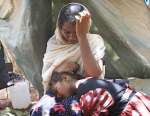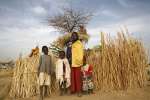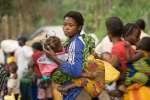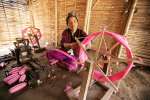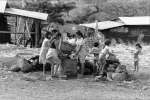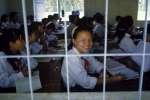- Text size
 |
|  |
|  |
| 
- Français
Women's training project in northern Myanmar generates income and goodwill
News Stories, 29 December 2010
YANGON, Myanmar, December 29 (UNHCR) – In a place where jobs are scarce and social mores discourage women from working outside the home the opportunity to learn a new skill and contribute to the family income received an enthusiastic response from the female residents of Mee-chaung-zay, a remote village in Myanmar's northern Rakine state.
Thirty-seven-year-old Azeevahar, a Muslim woman in a community that also includes Hindus, Rakhine and Bamar residents, was one of the first to enroll in the advanced sewing course, which is funded by UNHCR, and she is hoping she will be able to pass on her good fortune to others.
"There are many girls and young women in my village who are eager to learn sewing because they know it could bring in a good income," she said. "I want to be able to help them as others have helped me."
The training is offered by Community and Family services, an NGO which is supported by the UN refugee agency. It aims to give new skills to women who have already been working as sewing trainers in their villages.
About 750,000 Muslims live in this area with the remainder of the population composed of the ethnic Rakhine people, and small numbers of Dynets, Hindus and other groups. The culture, traditions and language of Muslims are distinct from the rest of the population of Myanmar and other ethnic groups living in northern Rakhine State. UNHCR began working in the area in 1994 to facilitate the return of refugees who had been living in neighbouring Bangladesh.
The area's remoteness, scarce resources and poor transportation links mean there are few opportunities for residents to attend school or find jobs. Fishing and farming are the main sources of income and these, too, are seasonal.
Azeevahar's husband works as a farm laborer in the village. When there is no work on the farm, Azeevahar's income from sewing and from sewing training helps support the family. She began teaching sewing several years ago after attending a UNHCR-funded training program. This time, the advanced training will enable her to upgrade her skills.
"I'm so glad to get chance to learn new things and improve my skills," she said. She recently made the difficult journey to UNHCR's field headquarters in Maungdaw from her village so she could attend the course. In addition to learning new skills, women attending the 13-day course also receive instruction in health and nutrition, basic bookkeeping and sewing-machine maintenance.
The courses also aim to foster co-existence between the region's Muslim and Rakhine communities. Twenty-five women from different religions and ethnic groups drawn from villages across the state take part. Working together the women have a chance to make new acquaintances and improve their understanding of each others' culture.
UNHCR-sponsored courses such as the sewing initiative are designed to promote the rights and well-being of people in the region while encouraging co-existence between different ethnic communities.
By Kyaw Soe Lynn in Yangon, Myanmar



